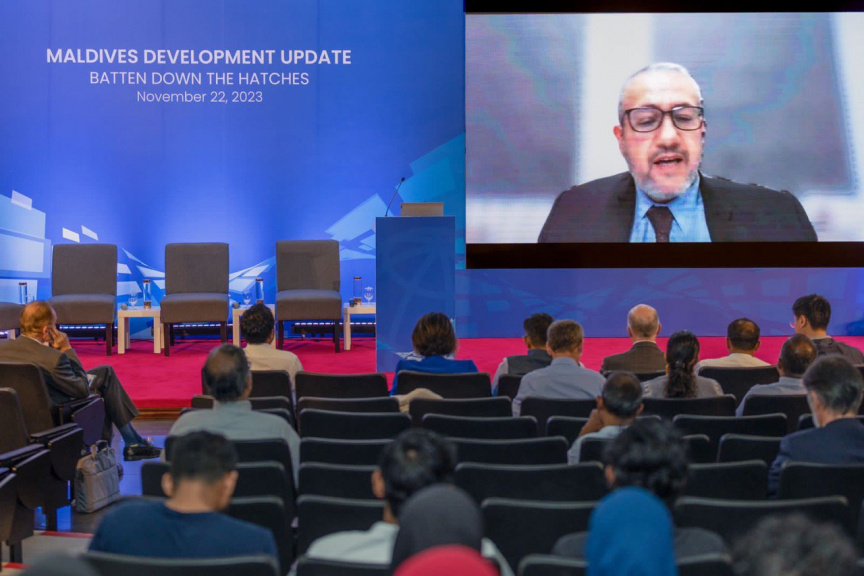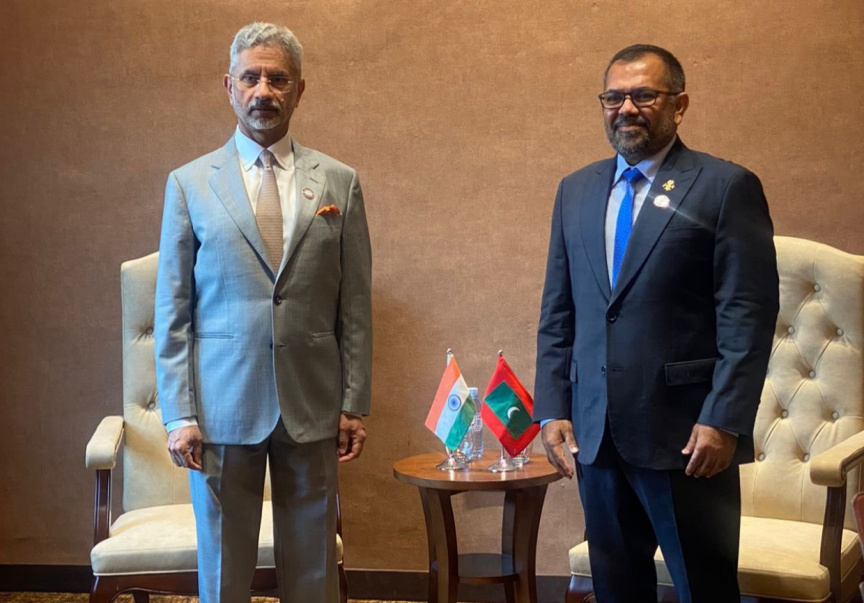The World Bank warned on Wednesday that the Maldives faces significant fiscal challenges, and having failed to achieve its targets to reduce fiscal deficits, the national debt is projected to hover above 115 percent of GDP over the medium term.
It its latest Maldives Development Update, the World Bank said the Maldives faces significant economic risks from rising spending, high debt and external shocks, despite a projected 6.5 percent growth in real GDP in 2023, and an average of 5.4 percent from 2024 to 2025.
Launched last month, Batten Down the Hatches, was the subject of an event on Wednesday organized by the World Bank and the Maldives National University (MNU).
The report offers a cautiously optimistic forecast for the Maldives’ economic trajectory, anchored by the robust performance of the tourism industry.
However, the country faces significant fiscal challenges, exacerbated by global commodity price surges, escalated government expenditure on capital projects and subsidies, and the central bank’s ongoing budget deficit financing.
The world bank warned that these issues require immediate and decisive fiscal reforms, including better management practices for public investment, moving toward targeted subsidies, increasing revenues, prudent debt management for a meaningful fiscal adjustment.
While Maldives had plans to reduce fiscal deficits, the country has failed to achieve its targets so far and national debt is projected to hover above 115 percent of GDP over the medium term.
The World Bank said that though the government increased Goods and Services Tax (GST) rates earlier this year, yet more decisive and prompt actions are required, particularly on the expenditure side, as the expected subsidy reforms for 2023 have been delayed.
“For fiscal prudence, Maldives must urgently refine its expenditure strategy and enhance revenue generation,” said the institution.
The World Bank recommended essential reforms, including:
Overhauling the Aasandha national health insurance program
Rationalizing budgetary contributions for state-owned enterprises, particularly in the energy and food sectors
Moving towards targeted subsidies
Establishing a robust public investment framework to ensure orderly and strategic infrastructure development
On revenue enhancement, the World Bank recommended that immediate efforts should concentrate on:
Expanding the tax base
Leveraging domestic revenue streams
Promoting equitable taxation
Faris H. Hadad-Zervos, the World Bank Country Director for Maldives, Nepal and Sri Lanka, said that while Maldives has shown remarkable resilience and recovering from the Covid-19 pandemic, it will need to remain vigilant in the face of new and emerging shocks such as conflicts around the world, price volatilities in global markets, and high inflation affecting the disposable income of people in major tourist markets.
“There is an urgent need to address the country’s fiscal and external vulnerabilities, especially through prudent debt management and expenditure reform measures, and develop a sustainable and resilient infrastructure investment framework, to ensure long-term growth and prosperity for its people,” he added.
The World Bank said the Maldives has achieved remarkable results in basic infrastructure services, outperforming many of its neighbors and other Small Island Developing States.
However, as a result of rising infrastructure spending, public debt sharply increased, especially during the Covid-19 crisis – subjecting Maldives to major fiscal vulnerabilities.
There are still big gaps in infrastructure access between the capital Male’ City and the outer atolls, where many people lack services like piped water, sewage, and broadband internet.
Maldives is trying to close these gaps, but the country faces many challenges common to Small Island Developing States like the worsening impacts of climate change and limited fiscal space.
“To improve, Maldives needs to take into account the high public debt reality, carefully and orderly plan for investments, and coordinate better among different ministries and agencies, especially for projects that involve multiple sectors,” said the World Bank. “The country also needs to prioritize sustainability and resilience, given its exposure to climate change.”
Source(s): sun.mv

 News3 days ago
News3 days ago
 News7 days ago
News7 days ago
 News7 days ago
News7 days ago
 News2 days ago
News2 days ago
 World3 days ago
World3 days ago
 World3 days ago
World3 days ago
 Business7 days ago
Business7 days ago
 News3 days ago
News3 days ago


















